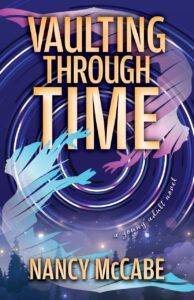16-year-old Elizabeth is dealing with some growing pains. Being bi-racial, she doesn’t look like the other kids in her school, she’s worried about the changes to her center of gravity turning her love of gymnastics into something scary, and she’s struggling with a crush on her ex-best-friend, Zach. With very little hope of finding answers from her mother, she turns to Zach who suggests leaping through time in an abandoned time machine. There, Elizabeth meets a few different characters who take her on an adventure, teach her about herself, and race against someone who is trying to destroy the future.
We’re so pleased to feature guest writer Nancy McCabe, author of the YA novel Vaulting through Time on BCB today.
Time Travel as a Hedge against Mortality – by Nancy McCabe
While writing my young adult novel Vaulting through Time, I found myself pondering something I frequently tell my students: that underlying all good literature is awareness of our mortality. What I mean is that a good story or poem reminds us that joy gains intensity the more we understand about sorrow. Life is sweeter and more meaningful because it’s temporary. Beauty is more piercing because it’s fleeting.
While genre writing is often dismissed as escapist, it has the capacity to confront darker sides of reality in different ways from realistic, literary writing. While some genre writing also represents fantasies of power through violence or magic or the ability to survive the end times, these fantasies are made all the more potent and satisfying by our awareness of our mortality. They offer gentle, sometimes roundabout routes to process philosophical ideas around our existence and ultimately the reality of death.
In my novel—which is classified as science fiction but contains many elements of contemporary and historical writing—protagonist Elizabeth, a teen gymnast who has developed fear issues around tumbling, discovers that there are significant things she doesn’t know about her origins. She also discovers that with the aid of a mysterious watch that is actually a time machine, she can catapult into the past to try to find answers—if she can conquer her fear of the vault.
Elizabeth gradually confronts that fear and begins to piece together the mystery of her origins. But when an identical watch to her own is stolen, she has to chase the thief through time and great moments in gymnastics history to stop her, fearing that one wrong move will completely erase Elizabeth’s existence. And when, for a brief interlude, Elizabeth attempts to abandon her quest and return to her own time, she discovers that her life as she knows it is in fact in jeopardy, and so she is forced to resume her pursuit of the thief.
Time travelers across literary genres face similar philosophical questions, grappling with questions of free will vs. determinism: what can they change? What is destined to happen no matter what they do? While most time travelers know better than to kill their grandparents (the Grandfather Paradox), their very appearance in another time period could lead to a radically altered world, the same way a butterfly flapping its wings could theoretically lead to a chain of events that cause a typhoon (the Butterfly Effect).
And all of this leads to the question that underscores all time travel stories: what if our existence could be simply obliterated? What if we somehow prevent ourselves from ever existing at all? Isn’t that a kind of death? But how could we disappear and yet still be able to exist to travel through time?
In his book Time Travel: A History, James Gleick points out that humans are less afraid of dying itself as we are of a future where we don’t exist and of the idea that our lives are simply “an eyeblink of time, an instant never to return.” While time travel forces us to grapple with difficult questions, ultimately it’s also reassuring. Time travel breaks the bounds of our chronological and limited timelines. Doesn’t it confer a kind of immortality to be able to transport ourselves to the past and the future, to places beyond the confines of our lifespans? “Why do we need time travel?” asks Gleick. “All the answers come down to one. To elude death.”
In the process of offering a hedge against death, time travel sharpens characters’s and readers’s passion for life. Elizabeth gains new appreciation for family ties as she undergoes her journey of growth and discovery and finding her place in the world. Traveling through time helps her to see her human limitations—and her strengths. And eventually, she comes to understand the ultimate message of time travel: that our existence has meaning, that even our small acts have an impact on the world, that in some form all of our choices and acts live on.
CLICK HERE FOR BOOK CLUB QUESTIONS
 An adoptive parent and former longtime gymnastics mom, Nancy McCabe is the author of six books for adults and has published articles in Newsweek, Salon, Writer’s Digest, The Brevity Blog, and the Los Angeles Review of Books, among many others. She’s a Pushcart winner and her work has been recognized nine times on Best American Notable Lists. She directs the writing program at the University of Pittsburgh at Bradford and teaches in the graduate program at the Naslund-Mann School of Writing at Spalding University.
An adoptive parent and former longtime gymnastics mom, Nancy McCabe is the author of six books for adults and has published articles in Newsweek, Salon, Writer’s Digest, The Brevity Blog, and the Los Angeles Review of Books, among many others. She’s a Pushcart winner and her work has been recognized nine times on Best American Notable Lists. She directs the writing program at the University of Pittsburgh at Bradford and teaches in the graduate program at the Naslund-Mann School of Writing at Spalding University.




Useful article, thank you. Top article, very helpful.